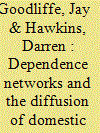|
|
|
Sort Order |
|
|
|
Items / Page
|
|
|
|
|
|
|
| Srl | Item |
| 1 |
ID:
152420


|
|
|
|
|
| Summary/Abstract |
How and to what extent do states influence the level of democracy and autocracy in other states? We argue that states exist internationally in dependence networks with each other and that those networks provide pathways for influence on a state’s domestic institutions. For any given state, a dependence network is a set of partner states with whom it regularly engages in exchanges of valued goods, where those exchanges would be costly to break. We find that an index of three such networks–trade, security and shared international organization membership–significantly influences the domestic political institutions in a given state. These changes are substantively large in the long run, similar in size to regional and global levels of democracy. State capabilities figure heavily in our network measures, thus emphasizing the role of power in the diffusion of domestic political institutions. We also find that network-influenced change works both ways: states can become more autocratic or more democratic.
|
|
|
|
|
|
|
|
|
|
|
|
|
|
|
|
| 2 |
ID:
111745


|
|
|
|
|
| Publication |
2012.
|
| Summary/Abstract |
This article explores why governments commit to human rights enforcement by joining the International Criminal Court (ICC). Compared with other international institutions, the ICC has substantial authority and autonomy. Since governments traditionally guard their sovereignty carefully, it is puzzling that the ICC was not only established, but established so rapidly. Looking beyond traditional explanations for joining international institutions, this study identifies a new causal factor: a country's dependence network, which consists of the set of other states that control resources the country values. This study captures different dimensions of what states value through trade relations, security alliances, and shared memberships in international organizations. Using event history analysis on monthly data from 1998 to 2004, we find that dependence networks strongly affect whether and when a state signs and ratifies the ICC. Some types of ratification costs also influence state commitment, but many conventional explanations of state commitment receive little empirical support.
|
|
|
|
|
|
|
|
|
|
|
|
|
|
|
|
| 3 |
ID:
155500


|
|
|
|
|
| Summary/Abstract |
Americans think the US foreign aid budget is far too generous. Can information change those views? We identified ten prominent arguments about aid in public discussion, five positive and five negative. In a survey experiment, we exposed respondents to one of those arguments with five associated facts. Most of the arguments in favor of aid made respondents more supportive, while most of the arguments against aid made them less supportive. Arguments that focused either positively or negatively on economic development in recipient countries or advancing US interests made little difference. In contrast, arguments about the domestic costs of foreign aid or those that invoked moral considerations like recipient need or corruption had fairly large effects on attitudes. The most successful argument, on the low cost of aid, reduced aid opposition from 67 to 28 percent. When respondents saw both pro and con arguments together, however, arguments generally lost their efficacy. The only exception was the argument about the low cost of aid, which altered opinions in some ways—even when countered with anti-aid arguments. Our results are somewhat surprising given the conventional wisdom that people are motivated reasoners who reject new information that does not conform to their worldview.
|
|
|
|
|
|
|
|
|
|
|
|
|
|
|
|
| 4 |
ID:
058447


|
|
|
| 5 |
ID:
083124


|
|
|
|
|
| Publication |
2008.
|
| Summary/Abstract |
Especially since the end of the Cold War, the Council of Europe (CE) and the Organization of American States (OAS) have acted to protect democracy in their member states from erosion or reversals, with CE policies more robust than those in the Americas. What explains this variation? I develop an argument focusing on institutional permeability, or the extent to which those organizations are accessible to nonstate actors. Permeability consists of three dimensions: range of third parties allowed access, level of decision making at which access is granted, and transparency of IO information to those third parties. Higher levels of permeability are likely to produce higher levels of constraint on state behavior through increasing levels of precision and obligation in international rules and practices. Alternative explanations, summarized as regional democracy norms, domestic democratic lock-in interests, and the power of stable democracies cannot explain the variation in multilateral democracy protection. More broadly, this article suggests that "democratizing" IOs by allowing ever-greater access to nonstate actors is likely to result in stronger, more constraining international rules, even in areas where states most jealously guard their sovereignty, such as the nature of their domestic political institutions.
|
|
|
|
|
|
|
|
|
|
|
|
|
|
|
|
| 6 |
ID:
083659


|
|
|
|
|
| Publication |
2008.
|
| Summary/Abstract |
In this paper, we identify authority as an important dimension of variance among international institutions. Essentially, the greater the authority of i states have yielded to them. Highly authoritative institutions can make decisions that legally bind domestic governments on specified issues even without those governments' consent. Over the past 20 years, scholars have viewed the evolution of international institutions largely through the lens of state motives. We argue that it is time to think more systematically about the role of the structure of the international system. Two factors that impact international structure-previously existing institutions and the presence of systemic shocks-can complement theories of actor motives to better account for the level of sovereignty yielded to authoritative international institutions. We illustrate the potential importance of including structural variables by applying the argument to sets of cases in currency cooperation and human rights. We find that structural factors increase the probability of states yielding sovereignty to international institutions, though structural factors are only a permissive cause of institution formation
|
|
|
|
|
|
|
|
|
|
|
|
|
|
|
|
|
|
|
|
|